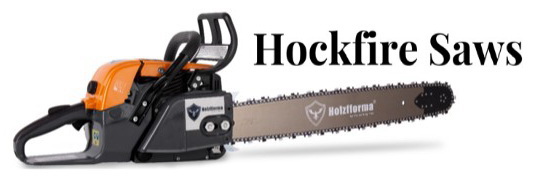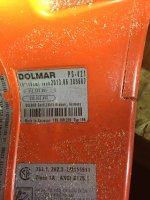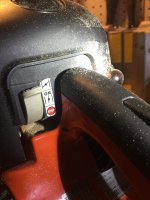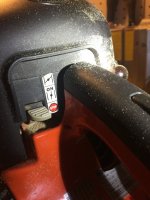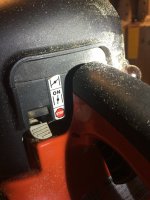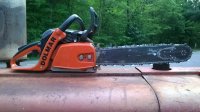Sir.....I live next the Canadian border.
When I was younger, I worked for a customs broker. We legally took manufactured goods that were clearly labeled "made in china" and relabeled to say "made in Hong Kong"
It's a technicality for import/export.
Why? I don't know....don't care.
I'm not an import specialist, but if you need to know, several of my good friends work for US Customs & Customs Brokerages.
Read Scotts post again and don't always believe what a sticker tells ya!
You're absolutely right that one shouldn't always believe what a sticker says. Of course one also shouldn't always believe the stories told by a company's sales reps, or by its salesmen.
I think that I understand the messaging problem. For many years the company, its sales reps and its dealers have trumpeted the fact that Dolmar/Makita saws were made in Germany. I watched a marketing video produced by Dolmar that brags about how each saw is followed along the assembly line by a skilled German craftsman who takes "ownership" for the quality of that particular saw. Germany has a global reputation for high quality manufacturing, based in part on its skilled workforce. People like the idea of a skilled German craftsman assembling their saw. More broadly, the "Made in Germany" label is a marketing asset.
A potential problem arises when assembly is offshored to China. First, the "Made in China" label is not an asset. It's a liability. There are two reasons for this. First, many Chinese products have a reputation for emphasizing low cost at the expense of quality. Second, there is a growing political backlash to the offshoring of more and more manufacturing jobs to China. People are getting fed up.
So what is a company to do? Try to have it both ways:
Yes, we used to claim that our skilled German assembly-line workers were an important part of our quality assurance, but now we claim that the country of assembly actually isn't important. Our Chinese workers are just as good. It's all highly automated anyway. It doesn't take much skill to slap a crank into a crankcase. (I had a dealer tell me this.)
Yes, the label on the saw says "Made in China", but it's actually manufactured in Germany. You should ignore the label. The key components are still made in Germany, and that's what matters. Forget the video we released earlier about the special qualities of our German assembly line. That's not what we want to emphasize now. It's ALL about the German components.
It's not easy to pivot in this way, but it will probably work. Moving assembly to China helps to control costs. LOW PRICES and mumblings about the German origins of the saws (ignore that label!) should help move a lot of saws. But you shouldn't be surprised when you get a
bit of pushback. There are at least a few folks who are upset about the unrelenting shift of manufacturing jobs to China. Some of these people may grumble, but as we all know such concerns are unlikely to trump low prices when it comes to sales.
Doug







